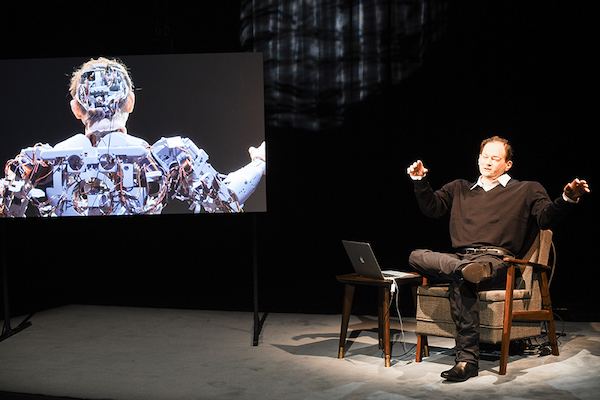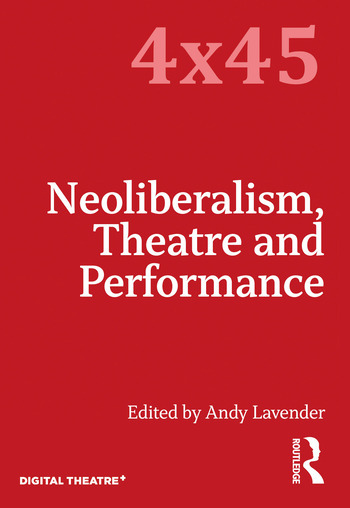Theater Commentary: Theater in a Time of Emergency? — The Same Old Same Old
By Bill Marx
Are Boston’s stage critics disengaged from reality? Or is it that they afraid to speak up?

A scene from Uncanny Valley, a 2019 production at Munich’s Kammerspiele by the Berlin-based experimental trio Rimini Protokoll — the show starred an “actroid.” Courtesy: Rimini Protokoll. Photo: Gabriela Neeb
A recent column by Vanessa Thorpe in The Guardian raised an essential but uncomfortable question about theater criticism during the pandemic as well as after. London publications have posted a succession of raves, an avalanche of huzzahs that are accumulating as we approach (the hoped for) end of the Delta surge.
But how reliable these recommendations are has been called into question by recent murmurings. Many are suggesting that reviewers are being too kind as the shadow of the pandemic finally lifts. Is there perhaps a clandestine pact to encourage audiences back out with some concerted cheerleading?
I have no idea what secret understandings have been forged among West End critics, but there is no need to indulge in paranoid speculation about Boston-area theater coverage, at least at the mainstream Boston Globe-NPR syndicate and its obedient satellites. The answer is as depressing as it is obvious. Emerging from its forced hibernation for live performance, theater appears to be in trouble, so our compassionate reviewers/publicists/reporters feel duty bound to come to the rescue — especially when it comes to the efforts of our major theaters. The rah-rah is uninhibited: troupes must be supported, regardless of the quality of their productions or the poverty of their imaginations.
London publications are at least willing to discuss the issue of how theater is being treated in the media during and after the plague. Here there is little but puffery about issues that bear on the artistic health of our stages as well as the continued relevance of theater criticism. What’s more, our country is dealing with not just the pandemic, but other elemental crises. But you wouldn’t know it from what our theaters are programming. The coming crop of comedies, musicals, and tap-dancing extravagances may well be entertaining, but it is easy to see that they have been picked for their power to reassure theater’s predominately white audiences that all is well. Time to laugh and heal and spend. American democracy is under dire threat (that will no doubt aid the marketing campaign of the American Repertory Theater’s Broadway-bound production of the musical 1776) and the Climate Crisis is growing as the collective will of the world wilts (according to a new study by scientists from Harvard and three British universities, burning fossil fuels kills nearly nine million people worldwide and an estimated 350,000 in the US every year. The staggering death toll is more than double the WHO’s 2017 estimate of deaths caused by air pollution). The theater needs to treat these assaults as emergencies. At the very least, our critics should be skeptical about theater’s return to the norm, its fear of reflecting the world around us. Instead, our well-heeled publications have nothing critical to say about what our theaters are choosing to stage. Whatever is selected, is right. And it is usually deemed to be damned good.

Are Boston’s stage critics disengaged from reality? Or is it that they are afraid to speak up? Skepticism about theater programming calls attention to the homogeneity and conventionality of what’s on offer. But, as Thorpe suggests, having the courage to risk controversy — by calling out theatrical mediocrity and artistic timidity — is an elemental part of a serious critic’s responsibility: “It is dangerous though for stage and film productions to be treated with kid gloves at any time.” When that happens, “then the whole enterprise becomes what it is often accused of: vainglorious irrelevance.” And that is where our theaters and stage coverage are headed at full speed — an irrelevance that will lead to further attenuation.
The Stage‘s Kate Malby rebutted Thorpe’s call for cutting criticism, and her reaction underlines just how weirdly Boston’s arts critics have reacted to the pandemic and its aftermath: “But I know that many, like me, are still overwhelmed to be back in theatres. We could use more honesty about the subjective emotions affecting everyone — creators, critics, lay audiences…. we are navigating shared trauma.” Send in links to arts coverage penned by our city’s critics that conveys some sort of overwhelming passion, the pain or anger that reflects a writer grappling with collective trauma. Tears at the sight of the return of live theater? Who? Where? When? What we are getting is pretty much the language of marketing — no time for feelings when there is selling to be done.
So what should our critics be demanding? Or at least suggesting? The common thread must be that the old norms will no longer do. What else might be proposed will depend on the sensibility of individual reviewers, their vision of what would make for a healthy culture. A public discussion of conflicting ideas would be enormously beneficial. For me, material tailored for Broadway is the past for theater that matters, not its future. An up-to-date place to start would be to take a look at the essays (and extensive bibliography) in Neoliberalism, Theatre and Performance (Routledge, 2021), some of which discuss companies (Berlin’s Rimini Protokoll, Glasgow-based artist Nic Green) and scripts that have “developed performative strategies of resistance that persist and are frequently revived,” works that model “fairer, better, more just social alternatives.”
Of course, our critics could just go back to Shakespeare to look for advice on how theater should move forward. Salman Rushdie puts it well at the end of his homage to the Bard in his just-published collection Languages of Truth: Essays 2003-2020 (Random House, 2021):
And when one lives at a hinge moment in history, as we do, as Shakespeare did when he wrote his protean plays, a moment when everything is in flux, everything is changing at immense speed, when the future is up for grabs and dark storm clouds rush across the sun, and where there are plagues and dragons loose in the world, then it becomes essential to admit that the old forms will not do, the old ideas will not do, because all will need to be remade, all, with our best efforts, must be rethought, reimagined, and rewritten, and to do otherwise would be to fail, most lamentably to fail, in the pursuit of our art.
Plagues and dragons are afoot — critics of the stage should not let theaters get away with pushing these “dark storm clouds” into the wings in an effort to evade the call to transform theater. Because that will lead to failure.
Note: Recently I wrote about the 50th anniversary of Edward Bond’s powerful adaptation of King Lear. I was gratified to read that Rushdie is an admirer of the script as well. The “extraordinary play … took on Shakespeare in a heavyweight prizefight and somehow went the distance, failed to get steamrollered, and came out of the battle with what is called a draw in England and, in an oddly sartorial image, a tie in America.” Rushdie goes on to discuss Bond’s 1973 play Bingo, in which Shakespeare gets drunk with Ben Jonson, “Edward Bond’s Ben Jonson, who has come up to visit Shakespeare in his mysterious Stratford retirement, to penetrate a secret as profound as the mystery of his genius — namely, the secret of his silence.”
Bill Marx is the Editor-in-Chief of the Arts Fuse. For just about four decades, he has written about arts and culture for print, broadcast, and online. He has regularly reviewed theater for National Public Radio Station WBUR and the Boston Globe. He created and edited WBUR Online Arts, a cultural webzine that in 2004 won an Online Journalism Award for Specialty Journalism. In 2007 he created the Arts Fuse, an online magazine dedicated to covering arts and culture in Boston and throughout New England.

Bravo Bill! The temptation for critics to protect the things they care about is very real and has been increasingly pernicious over the past 20 years as both the arts and arts journalism has been under stress. If you’re the only critic in town (or one of the few) and you know harsh words might damage or sink the local orchestra or theatre company and you care about them, you pull your punches. Even in big news organizations like NPR, they only do reviews of things they’ll like – the thinking being we have so little space for reviews we can’t afford to do negative reviews because it’s more helpful to guide people to what they might like. This is the corrosive effect of treating criticism as consumer reports (which alas is the dominant form these days).
But this very much devalues criticism and ultimately defeats the purpose. It’s tedious to read arts evangelists because they over-praise and over-promise. I like very much your suggestion that the focus right now ought to be on the new contexts in which we find ourselves after the tumultuous and world-changing events of the past year.
[…] in the theater to lay off the boosterism a tad and acknowledge the trauma? This includes critics. Bill Marx astutely argues in Arts Fuse that critics (he singles out the ones in Boston) should be calling out theaters for their […]
[…] to come to the rescue — especially when it comes to the efforts of our major theaters,” writes Boston’s The Arts Fuse. “The rah-rah is uninhibited: troupes must be supported, regardless of the quality of their […]